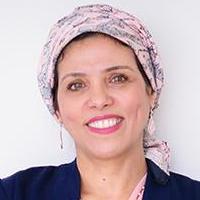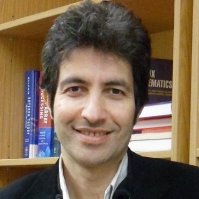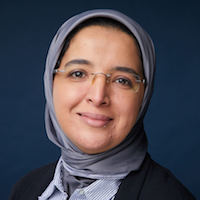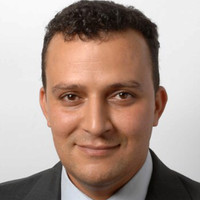Keynotes

Pr. Halima Bensmail
Qatar Computing Research Institute (QCRI), Qatar
Dr. Halima Bensmail is a principal scientist at Qatar Computing research institute (QCRI) and a joint Full Professor at HBKU’s College of computer science and Engineering (CSE). She is the founder of the Computational Biology group at QCRI. Dr. Bensmail's work focuses on developing new machine learning algorithms for solving large-scale and high-dimensional problems for achieving significant biomedical discoveries. Dr. Bensmail joined QCRI in 2011 while serving as an Associate Professor at the University of Virginia (EVMS), an associate professor at the University of Tennessee and an adjunct faculty member at Oak Ridge National Laboratory, USA. Prior to that, she held positions of a Research Scientist at the Fred Hutchinson Cancer Research Center (USA) and at the University of Leiden (The Netherlands); a Postdoctoral Researcher at the University of Washington in Seattle (USA). Dr. Bensmail completed her PhD at the University Pierre et Marie-Curie (Paris VI). She serves as a consultant and advisory member for a number of key computational biology and biomedical engineering projects and grants agencies such as Qatar National Research Fund, Qatar Anti doping lab, National Institute of Health (NIH), National Science Foundation (NSF). She has published numerous peer-reviewed manuscripts (+80) and has won multiple awards such as best junior researcher at the International Federation of Classification Society (Italy) and ARC2011 (Qatar).

Pr. Mounir Ghogho
International University of Rabat (UIR), Morocco
Pr. Mounir Ghogho received his MSc degree in 1993 and PhD degree in 1997 from the National Polytechnic Institute of Toulouse, France. He was an EPSRC Research Fellow with the University of Strathclyde (Scotland), from Sept 1997 to Nov 2001. In December 2001, he joined the University of Leeds where he was promoted to full Professor in 2008. In 2010, while remaining affiliated with the University of Leeds, he joined the International University of Rabat in 2010, where he is currently Scientific Advisor to the President and Director of IT Research Laboratory (TICLab). He served as Dean of UIR’s Faculty of computer science and logistics in 2013. He is also currently Director of CNRS-Associated International Lab (LIA) DATANET, in the field of Big Data. He was elevated to the grade of IEEE Fellow in 2018, a recipient of the 2013 IBM Faculty Award and a recipient of the 2000 UK Royal Academy of Engineering Research Fellowship. His research interests are in signal processing, machine learning (artificial intelligence), Big data, and wireless communication. He is currently a member of the steering committee of the Transactions of Signal and Information Processing. In the past, he served as an Associate Editor of many journals including IEEE Signal Processing Magazine and IEEE Transactions on Signal Processing, and a member of IEEE Signal Processing Society SPCOM, SPTM and SAM Technical Committees.

Pr. Loubna Benabbou
Université du Québec à Rimouski (UQAR), Canada
Dr. Loubna Benabbou is a Professor of Management Sciences at Université du Québec à Rimouski (UQAR) at Lèvis campus. Her research work lie in the development and application of machine/deep learning and decision sciences to transform data for making better decisions and improving operational processes. Dr Benabbou has been supervising several undergraduate and graduate students in projects for different Industries related to the areas of machine learning, decision sciences and operations management. Her research related to these fields has been published in international scientific journals and conferences’ proceedings. Dr Benabbou was an associate professor of Industrial Engineering at EMI School of Engineering. She was also a trader at Casablanca stock exchange and financial analyst and risk manager at the Caisse Marocaine des retraites the Moroccan largest intuitional fund manager. Dr Benabbou is an industrial engineer from EMI School of Engineering, she earned an MBA and a PhD in machine learning and decision sciences from Laval University.

Hicham Zmarrou
ABN-AMRO Bank, Netherlands
Dr. Hicham Zmarrou is a Data Science Tribe Lead at ABN-AMRO bank in The Netherlands. Hicham’s responsibilities are ,among others, providing analytical support for the conceptualization, development, and implementation of multiple, inter–linked Machine Learning projects, mentoring and developing teams of data scientists, providing Machine Learning and cloud related training, developing a vision and road-map for analytics across a product or functional group, etc. Hicham also gives regularly hands-on Machine Learning and cloud courses to companies starting their digital transformations journey. Hicham completed his PhD in Mathematics (Stochastic analysis ) at the University of Amsterdam. He serves as a R&D Engineer at the Dutch National Aerospace, and was active member of the European Big Data Value Association (BVDA).

Anys Boukli
Digital Partners SA. Switzerland
Mr. Anys Boukli is Chairman and Chief Executive Officer of Digital Partners SA. Anys combines 20 years of International Leadership experience. Expert in Digital Strategy, Transformation, Technologies, Disruptive Business Models, Board Advisory. Innovation Expert at the European Union and the United Nations (Artificial Intelligence, Big Data & Analytics, Open Innovation, Data Driven Policy Making). Digital Innovation Process, Business Innovation, Innovation Maturity assessment, Digital Roadmap. Mr. Boukli served as Chief Operating Officer for Switzerland & Middle East at Sword Group SE and was responsible for developing the regional market strategy for the services arm of the business in the Swiss and MENA market. Previously, Mr. Boukli was a Partner for the EMEA region within Cambridge Technology Partners / Novell before joining Bedag Informatique as Head of the French-speaking Swiss market and board member. Prior to that, he held various management positions in the Consulting and IT industries in Europe. Mr. Boukli holds a State Engineering degree in IT, as well as several Management and Leadership degrees from the International Institute for Management Development (IMD) in Lausanne and the Malik Institute in St-Galles.

Pr. Halima Bensmail
Developing new machine learning algorithm for computational Biology: Cases for Genetics, NGS and Protein crystallization
Genetic correlation, RNAseq co-variation are helpful in understanding the relationships among complex traits. The observation of substantial genetic correlation across a pair of traits or genes, can provide insights into shared genetic pathways as well as providing a starting point to investigate causal relationships. Attempts to estimate genetic correlations among complex phenotypes have motivated the analysis of large datasets as well as the development of sophisticated machine learning algorithms. I propose and discuss scalable Machine Learning algorithms to capture genetic correlations for these two type of omics data: SNPs and RNAseq. The method leverages the structure of data to obtain runtimes that scale sub-linearly with the number of individuals in the input dataset. I will also outline two software named “DeepCrystal” and “BCrystal” which use deep learning to identify proteins which can produce diffraction quality crystals without the need to manually engineer additional biochemical and structural features from sequence. The two models are based on Convolutional Neural Networks (CNNs), which can exploit frequently occurring k-mers and sets of k-mers from the protein sequences to distinguish proteins that will result in diffraction quality crystals from those that will not.

Pr. Mounir Ghogho
Can AI predict the future?
In this talk, I will address the issue of when, how and to what extent artificial intelligence can help predict the future. Some conventional and state-of the-art prediction prediction methods will be briefly described. Some case studies (e.g. predicting human mobility, Predicting web content popularity, predicting cyberattacks, predicting urban traffic, predicting urban pollution, predicting health issues, etc.) will then be briefly presented.

Pr. Loubna Benabbou
Machine Learning and Deep Learning, Challenges and Applications in Developing World: Case of the Moroccan Capital Market
The Moroccan capital market is one of the largest and the oldest in Africa. The major players in this market are: the Casablanca Stock Exchange, the financial market authority “AMMC”, the central depository “Maroclear“, brokerage firms, asset management companies, banks and insurance and reinsurance companies. The Casablanca Stock Exchange was created in 1929. Its first goal was to meet the rising needs for financial products and the globalisation of the Moroccan economy. Since 2000 the Stock Exchange changes its name to “Bourse de Casablanca SA” with a management board and supervisory board. It was one of the key development of the process of reform in the Moroccan capital market for better regulation of various market activities and a consolidation of the safety of investments. With the recent achievements of Casablanca Finance City, confirms the status of Morocco as a regional financial hub and as one of the most important capital markets of Africa. In this research, we try to understand the comportment of stock prices in Casablanca stock exchange and to predict their values. Many studies applied machine learning and deep learning models to stock market prediction. However, in our knowledge, the majority of those studies are not concerned by African capital markets. This work closes this research gap; our goal is the prediction of the movements (Up, Unchanged and Down) of the stock market prices in the very short term (10 to 60 min ahead). An experimental framework is proposed and a selection machine learning and deep learning algorithms: Support Vector Machines (SVM), Random Forest (RF), Gradient Boosted Trees (GBT), Artificial Neural Networks (ANN) and Long Short Term Memory (LSTM) is tested within the proposed framework. The comparison of these models is performed by the analysis of the precision and recall metrics and the CPU time of each model. The experimentations show promising results for different classification setups.

Dr. Hicham Zmarrou
The Road to Enterprise AI
Increases in the volume of data and the availability of compute power have driven a number of advancements in the field of Artificial Intelligence (AI), and AI technologies and applications are getting a flood of publicity in the media. While four in five executives agree that AI is a strategic opportunity for their organization, only about one in five has incorporated AI in some offerings or processes, and only one in 20 has extensively incorporated AI in their offerings or processes. There is a gap between expectation and action, and we are still in the early days of enterprise AI adoption. This presentation explores the path our company has taken to close this gap and to build an enterprise AI capability, thereby realizing the full value of this disruptive technology.

Anys Boukli
Big Data and Artificial Intelligence Vertical scenarios building a Horizontal platform
Mr. Anys Boukli is Chairman and Chief Executive Officer of Digital Partners SA. Anys combines 20 years of International Leadership experience. Expert in Digital Strategy, Transformation, Technologies, Disruptive Business Models, Board Advisory. Innovation Expert at the European Union and the United Nations (Artificial Intelligence, Big Data & Analytics, Open Innovation, Data Driven Policy Making). Digital Innovation Process, Business Innovation, Innovation Maturity assessment, Digital Roadmap. Mr. Boukli served as Chief Operating Officer for Switzerland & Middle East at Sword Group SE and was responsible for developing the regional market strategy for the services arm of the business in the Swiss and MENA market. Previously, Mr. Boukli was a Partner for the EMEA region within Cambridge Technology Partners / Novell before joining Bedag Informatique as Head of the French-speaking Swiss market and board member. Prior to that, he held various management positions in the Consulting and IT industries in Europe. Mr. Boukli holds a State Engineering degree in IT, as well as several Management and Leadership degrees from the International Institute for Management Development (IMD) in Lausanne and the Malik Institute in St-Galles.
